Our approach to workforce development focuses on preparing Chicago’s youth and emerging health professionals to meet local health challenges – in the clinic, the community and policy circles.
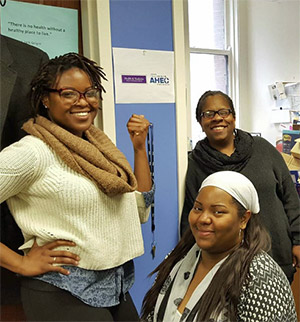 Host organization: Chicago AHEC is uniquely situated in the Health and Medicine Policy Research Group, a policy research, social justice minded organization that carries on the city’s rich and diverse tradition of healthcare advocacy and promotion of health equity. In 1981, as the national political climate shifted to one that put less emphasis on the needs of marginalized populations, Chicago social justice advocate Quentin D. Young, MD with a group of fellow health justice activists, decided to form a health policy think tank to research, educate and convene stakeholders to challenge health disparities. Chicago AHEC carries this perspective into its work. Our participants receive mentorship and inter-professional training to provide them with essential skills and promote best practices in primary care, health promotion, and system reform. The things that we care about and grapple with on a daily basis in our on-the-ground work give our AHEC a distinctive perspective that we bring to our programs.
Host organization: Chicago AHEC is uniquely situated in the Health and Medicine Policy Research Group, a policy research, social justice minded organization that carries on the city’s rich and diverse tradition of healthcare advocacy and promotion of health equity. In 1981, as the national political climate shifted to one that put less emphasis on the needs of marginalized populations, Chicago social justice advocate Quentin D. Young, MD with a group of fellow health justice activists, decided to form a health policy think tank to research, educate and convene stakeholders to challenge health disparities. Chicago AHEC carries this perspective into its work. Our participants receive mentorship and inter-professional training to provide them with essential skills and promote best practices in primary care, health promotion, and system reform. The things that we care about and grapple with on a daily basis in our on-the-ground work give our AHEC a distinctive perspective that we bring to our programs.
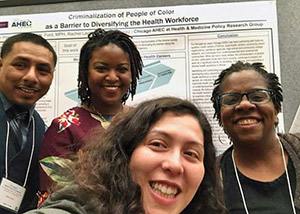 Area opportunities: Chicago is a premier health sciences city, with seven highly-ranked schools and affiliated medical centers. More than 20 hospitals are located in the Chicago AHEC region, which is also home to numerous skilled nursing, physical therapy, and other healthcare facilities. There are two medical schools, a number of four-year schools that offer degrees and certificate programs in a wide variety of health-related programs, and several campuses of the City Colleges of Chicago which offer health-related certificates, two year degrees and maintain transfer relationships with local colleges and universities.
Area opportunities: Chicago is a premier health sciences city, with seven highly-ranked schools and affiliated medical centers. More than 20 hospitals are located in the Chicago AHEC region, which is also home to numerous skilled nursing, physical therapy, and other healthcare facilities. There are two medical schools, a number of four-year schools that offer degrees and certificate programs in a wide variety of health-related programs, and several campuses of the City Colleges of Chicago which offer health-related certificates, two year degrees and maintain transfer relationships with local colleges and universities.
Community partners: Chicago AHEC works with a wide variety of partners, including the Center for Public Health Equity, Chicago Area Schweitzer Fellows Program, Court Involved Youth Program, Center for Long Term Care, and the Illinois ACES Response Collaborative. Together, we partner on workforce-related training and education as well as policy issues and local challenges. Our partners include the Healthy Chicago 2.0 Workforce Collaborative, Chicagoland Healthcare Workforce Collaborative, Chicago Jobs Council Workforce 360 and Chicago Citywide Literacy Coalition. We collaborate with Chicago Public Schools Career and Technical Education Unit, the Geriatric Workforce Enhancement Program at the Rush University Medical Center, and serve on the Malcolm X Community College Advisory Board for their Community Health Worker program.
Demographics: This region, with a population of 1.6 million, includes some of the city’s wealthiest areas and most of its immigrant/ethnic neighborhoods, with concentrated areas of poor economic conditions, health literacy/language issues, and low rates of insurance. The west side is overwhelmingly minority, with many of Chicago’s predominately Latinx neighborhoods and one of its two large African American areas. Six community areas have household incomes below $50,000 (below $35,000 in two), and unemployment is elevated in several. Some of the community areas have rates limited English proficiency much higher than the city rate of 7.8%.
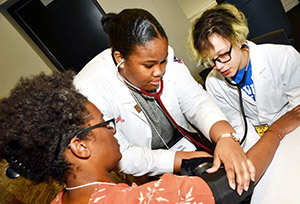 Local health challenges: In five community areas, 15% of residents reported feeling mentally unhealthy in a recent month. The region has above average rates of chronic asthma, adult diabetes, homicide, and alcohol mortality. Four community areas report infant mortality rates about 10% with pre-term births are above 14%; five report high opioid-related mortality rates. Fifteen percent of residents in the seven primarily Latinx community areas are without insurance.
Local health challenges: In five community areas, 15% of residents reported feeling mentally unhealthy in a recent month. The region has above average rates of chronic asthma, adult diabetes, homicide, and alcohol mortality. Four community areas report infant mortality rates about 10% with pre-term births are above 14%; five report high opioid-related mortality rates. Fifteen percent of residents in the seven primarily Latinx community areas are without insurance.
Our programs: Our programs and activities bring participants in touch in a practical way with health care in our underserved communities. Take a look.
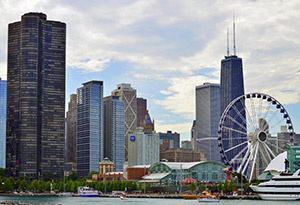 Our region: Chicago is a world-class city known for its culture, lakefront, and nightlife, and one with unparalleled access to many leading health care organizations. Chicago AHEC serves 40 of the city’s 77 community areas, and consists of the north and west sides of the city, the downtown and small portions of the near south side.
Our region: Chicago is a world-class city known for its culture, lakefront, and nightlife, and one with unparalleled access to many leading health care organizations. Chicago AHEC serves 40 of the city’s 77 community areas, and consists of the north and west sides of the city, the downtown and small portions of the near south side.
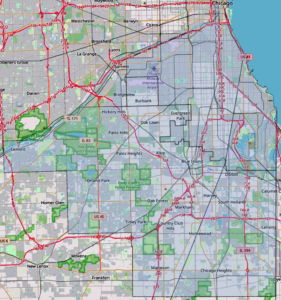
Click to enlarge
The Chicago AHEC region consists of 35 Chicago community areas.
Advisory Board
- Karen Aguirre, MPH, Program Manager, West Side United
- Megan Erskine, MPH, Director of School Health Centers, Heartland Health Centers
- Sheronda Kimbrough, MEd, CMA, President & CEO, Trinity Mobility Company
- Jaylon Jonyer, ATC, Athletic Trainer & Physical Education Teacher, Chicago Public Schools, Athletico
- Erica Martinez, MBA, MPH, Associate Director, Office of Community Engaged Research and Implementation Science (OCERIS), University of Illinois Cancer Center
- Steven K. Rothschild, MD, Associate Professor, Family and Preventive Medicine, Rush University Medical Center
- Cindy Vianey San Miguel, MPH, Center of Excellence Maternal and Child Health, UIC School of Public Health
- Judith Sayad, MPH, UIC School of Public Health & Illinois AHEC
- Melody Young, LPN, Working Professionals Network and Speakers Bureau, Chicago AHEC
- Joseph Zanoni, PhD, MILR, Latino Union of Chicago
 Illinois Area Health Education Centers
Illinois Area Health Education Centers